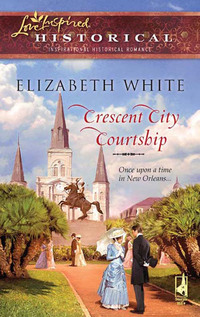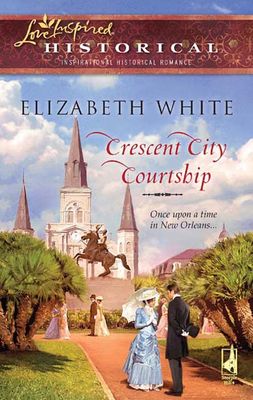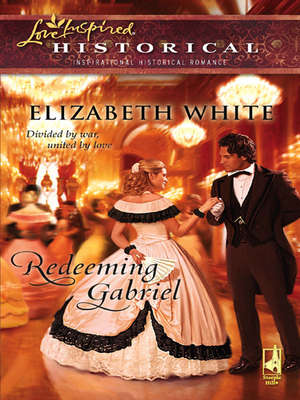Loe raamatut: «Crescent City Courtship»
“Tell me, Abigail, why it is you don’t subscribe to the belief of romantic love between marriage partners.”
She blinked and cut a glance at John. “What?”
“I’m curious to know if you are one of those women looking for all-consuming passion in a marriage partner.”
“I shall never marry.”
He laughed, assuming she was joking. But when she simply stared at him, his amusement faded. “You cannot be serious.”
She shrugged. “Who would marry me?” A faint smile traced her lips. “According to Dr. Pitcock, my head is too big.”
“No—what he said is that you are surprisingly normal for such a bright woman. I suppose you think there isn’t a man capable of keeping up with you.”
MILLS & BOON
Before you start reading, why not sign up?
Thank you for downloading this Mills & Boon book. If you want to hear about exclusive discounts, special offers and competitions, sign up to our email newsletter today!
Or simply visit
Mills & Boon emails are completely free to receive and you can unsubscribe at any time via the link in any email we send you.
ELIZABETH WHITE
As a teenager growing up in north Mississippi, Elizabeth White often relieved the tedium of history and science classes by losing herself in a romance novel hidden behind a textbook. Inevitably she began to write stories of her own. Torn between her two loves—music and literature—she chose to pursue a career as a piano and voice teacher.
Along the way Beth married her own Prince Charming and followed him through seminary into church ministry. During a season of staying home with two babies, she rediscovered her love for writing romantic stories with a Christian worldview. A previously unmined streak of God-given determination carried her through the process of learning how to turn funny, mushy stuff into a publishable novel. Her first novella saw print in the banner year 2000.
Beth now lives on the Alabama Gulf Coast with her husband, two high-maintenance teenagers and a Boston terrier named Angel. She plays flute and pennywhistle in church orchestra, teaches second-grade Sunday school, paints portraits in chalk pastel and—of course—reads everything she can get her hands on. Creating stories of faith, where two people fall in love with each other and Jesus, is her passion and source of personal spiritual growth. She is always thrilled to hear from readers c/o Steeple Hill Books, 233 Broadway, Suite 1001, New York, NY 10279, or visit her on the Web at www.elizabethwhite.net.
Elizabeth White
Crescent City Courtship
While Jesus was having dinner at Levi’s house, many tax collectors and sinners were eating with him and his disciples, for there were many who followed him. When the teachers of the law who were Pharisees saw him eating with the sinners and tax collectors, they asked his disciples: “Why does he eat with tax collectors and sinners?” On hearing this, Jesus said to them, “It is not the healthy who need a doctor, but the sick. I have not come to call the righteous, but sinners.”
—Mark 2:15–17
To Emma—because she loves historicals
and because she prays.
Contents
Chapter One
Chapter Two
Chapter Three
Chapter Four
Chapter Five
Chapter Six
Chapter Seven
Chapter Eight
Chapter Nine
Chapter Ten
Chapter Eleven
Chapter Twelve
Chapter Thirteen
Chapter Fourteen
Chapter Fifteen
Chapter Sixteen
Chapter Seventeen
Chapter Eighteen
Chapter Nineteen
Chapter Twenty
Chapter Twenty-One
Epilogue
Author’s Note
Questions for Discussion
Chapter One
New Orleans, November 1879
Gasping for breath, Abigail Neal pounded on Charity Hospital’s enormous oak front door, bruising her fist and driving a splinter into the heel of her hand. She’d covered the six blocks from the District at a flat-out run, but no one had offered to pick her up and take her to her destination. Not that she’d expected it.
“Come on, come on,” she muttered. “Someone answer the door.” She pounded again, this time with the flat of both hands. The sound echoed off the tall columns and wooden floor of the porch and reverberated through the hallway inside.
Where was everyone? Yanking the splinter out of her hand and sucking away a welling drop of blood, she peered through the little pane of glass in the door. Why lock the door of a hospital? To defend against marauding sick people?
Tess wasn’t going to make it if a doctor didn’t come soon.
Abigail was about to bang again when a pair of filmy, protruding eyes met hers on the other side of the window. The latch scraped back and the door opened, revealing a short, barrel-chested man with a pockmarked face. “You’ll have to go to the back door,” he said, squinting up at her. “Nurses are all in evening prayers.”
“I don’t need a nurse. I want a doctor.” Abigail forced herself to stand still, clutching her fingers together to keep from wringing her hands. People often wouldn’t help a person who seemed desperate.
The man scratched his head, disturbing the few wisps of gray hair clinging to his shining scalp. “Ain’t no doctors here to the front. That’s why I says go to the back and wait—that’s where the clinic is.” He looked her up and down. “You don’t look sick, no ways.”
“I’m not sick,” Abigail said, striving for patience. “I want you to fetch a doctor so that I can take him back to the—I want him to come with me.”
“Ain’t none here right now,” the guard repeated stubbornly. “Doc Laniere’s teaching a surgery lesson—”
“Doctor Laniere?” Abigail grabbed the man’s arm. “He’s the one I want. Someone told me he’s very kind and he’s the best doctor in the city.”
“He’s the best all right. But he’s busy, and—”
“Take me to him immediately.” Abigail straightened, well aware of the intimidating effect of her full height. “What is your name?”
“They call me Crutch.” The man glanced uneasily over his shoulder. “Mayhap I could see if Nurse Charlemagne—”
“I told you I don’t want a nurse. I want the doctor.” Abigail found herself on the verge of frustrated tears. Every moment of delay endangered not only Tess’s life but that of the baby. Pride hadn’t done a bit of good so far. “Please, Mr. Crutch. My friend is having her baby—she’s been laboring all day and most of last night. She’s getting weak, I don’t have a way to get her here and I don’t know what to do.”
An enormous sigh was followed by a clicking of tongue against teeth. “He’s gonna squash me like a mosquito,” Crutch muttered, then to Abigail’s relief, disappeared through a white pedimented doorway beyond the staircase.
Even though Crutch left the door standing wide, allowing an unobstructed view of the unadorned entryway, Abigail remained on the enormous two-story porch, unwilling to risk expulsion. She stood watching horse-drawn carriages rattle down Common Street. Some turned on Baronne before reaching the hospital, some continued to Philippa, where they rounded the corner of the beautiful green sward of grass which gave Common Street its name, then disappeared beyond tall rows of businesses. The scene was infinitely refined and orderly.
And she was going to bring the great doctor back with her to a tenement in the District. Well, he would just have to take her and Tess as he found them. She sat down on the broad top step of the porch and linked her fingers across her knees.
An interminable time later, Abigail heard the clatter of footsteps on the stairs behind her. She jumped to her feet and turned, expecting to see Crutch returning with the doctor. Instead she found a young man striding toward her with a black leather case in one hand and a fine felt hat in the other.
“I’m John Braddock,” he said with curt nod. “I understand you need a doctor.”
“Yes, but—” Wide-eyed, she stared at him. That name. What an odd coincidence. She blinked. “Mr. Crutch went for Dr. Laniere. He should be right back.”
“I sent him to bring the mule cart around for us.”
“But—I wanted the house surgeon. Where is he?”
Braddock frowned. “Dr. Laniere is conducting a surgery. Do you or do you not need a doctor?”
“I do, but—”
“Then we’d best hurry. Here’s Crutch with the cart.” He ran down the steps to the drive path, where the messenger was alighting from a small wagon pulled by a lop-eared mule.
Abigail picked up her skirts and followed. “But are you a doctor?” He was very young, perhaps in his mid-twenties.
Braddock vaulted onto the seat of the cart and took the reins from Crutch. “This is a medical college,” he said, reaching a hand down to Abigail. “I’m a second-year student, top of my class. Professor Laniere wouldn’t have sent me if he didn’t think I could deliver a baby. Come on, get in.”
Abigail stared up at him. A student? But Dr. Laniere was in surgery and Tess needed help now. She allowed young Braddock to pull her up onto the narrow seat, settling as far away from him as she dared without pitching herself onto the pavement.
“Where is the patient?” he asked, glancing at her.
“Tchapitoulas Street.”
“That’s a long street. Which part?”
“The District,” she managed, burning with humiliation. “We’re next to the saloon on the corner of Poydras.”
“I might have known.” He flapped the reins to set the cart into motion.
Abigail refused to look at him again, although the jostling of the cart forced her elbow to brush his again and again. She gritted her teeth. By the time they traversed the short distance to the tenement room she shared with Tess, her nerves were a raw jangle of anxiety, fear and resentment.
The young doctor spoke not another word to her until he stopped the cart in front of the saloon and lightly jumped down to tie the mule to a hitching post. He reached for his bag, then offered a hand to Abigail. “Perhaps you could tell me what the trouble is and who I’m to treat.”
Disdaining his hand, Abigail got down from the cart on her own. “My friend Tess has been laboring to deliver her baby all day and most of last night. She was so weak and frightened…I didn’t know what to do.”
“When did contractions start?”
Abigail hurried for the door of the tenement. “About this time yesterday.”
Braddock grabbed her arm. “She’s been in labor for twenty-four hours and you’re just now asking for help?”
“I’ve delivered babies before.” She jerked away from him. “It’s just that I’ve never encountered this difficulty.” Not for the first time she wished she’d had the opportunity for training this rich boy had. Then she’d have known what to do without incurring his disdain.
“Never mind. Which room?” They were in the tiny ground-floor entryway. Narrow unpainted doors opened to the right and left and the treads of a rickety staircase wobbled straight ahead.
“This way.” Abigail turned to the door on the right and lifted the door latch. There was no key because there was no lock. “Tess?” She entered the dark, shabby little room, frightened by the silence. She could sense the silent young doctor behind her.
A soft moan came from the shadows where Tess’s pallet lay against the wall.
Relieved, Abigail hurried over. “Tess, I’ve brought a doctor. He’s going to help us bring the baby out.”
“I can’t…I’m too tired, Abby.” Tess’s voice was a thread.
Abigail fell to her knees and laid a gentle hand on Tess’s distended belly. “Yes, you can. Dr. Braddock is going to help you.” She looked over her shoulder to find him setting his bag on the table.
He looked up. “We’ll need all the extra linens you have. You’ve a way to boil water?”
Abigail swallowed. “Of course.”
“Abigail? Abby?” Tess’s voice sounded terrified. “It’s starting again. The pain—” A scream interrupted her words, ripping from the center of her being.
Torn between compassion and the practical need to attend to the doctor’s wishes, Abigail hurried to find the pile of clean rags she’d been collecting against Tess’s lying-in. As she mended the fire she’d left burning low in the tiny cookstove that squatted against the only exterior wall of the room, she was conscious of Tess’s inhuman, wailing accompaniment to Braddock’s rather jerky movements.
He laid out a collection of shining instruments on one of the rags, arranging them with fastidious neatness. He seemed slow, reluctant.
She watched him with resentment. She should be the doctor, not him.
By the time she had a tin pot of water boiling to her satisfaction on the stovetop, Tess’s screams had subsided to whimpers. Abigail gestured for Braddock’s attention. “Now what?”
He got to his feet. “We need to let the water cool a few minutes. I want to wash my hands and instruments. Do you have lye soap?”
She frowned. “We need to hurry. She’s not going to be able to stand another contraction like that.”
Braddock scowled. “I’ll remind you that you came to me for help. Professor always washes everything.”
Abigail stared at him. If she argued with him, he would stand there until Kingdom Come, and Tess would die. Tight-lipped, she found him the soap, then knelt beside Tess to bathe her head with a cool cloth. “Hold on,” she murmured. “Just a few more minutes.”
Behind her John Braddock doused his instruments one by one in the boiling water, then returned them to the clean cloth. After removing the pot from the stove, he stood waiting for it to cool, hands in the pockets of his trousers, staring at nothing.
Abigail watched him. His body was tall and strongly built inside those fashionable clothes. He’d laid the beautiful hat on the shaky pine table, revealing a headful of wavy golden brown hair. She supposed one could call him good-looking, although her perspective on handsome men was admittedly skewed. She had yet to see him smile, but his nose was firmly arched, with fine nostrils, and the eyes wide-set and intelligent.
His brain was the most important part of his body as far as she was concerned.
Finally, just as Tess started screaming again, he decided the water was cool enough to the touch and proceeded to thoroughly soap and rinse his hands. Catching Abigail staring as he dried them, he gave her a mocking bow.
“Now, your ladyship, I’m ready.”
Chapter Two
John knelt beside his moaning patient and stared at the baby in his hands. For the first time in his life he uttered the name of God in prayer. He’d never lost a life before—at least not on his own.
He laid the stillborn infant on a ragged towel, then turned to the woman who had been quietly hovering behind him for the past two hours. He held out a shaking hand. “Give me that needle and suture.”
She handed him the implements he required, watching his every movement with vigilant, protective eyes.
He began the job of sewing up the woman’s torn body. “Here, hold this sponge.”
His provisional nurse knelt and followed his gestured instructions. “What about the baby?”
“You can bury it later. It’s more important to take care of your friend.”
Abigail gasped, dropping the sponge. “The baby’s dead? How could you let it die?” She picked up the infant and cradled it against her bodice. Her face twisted and silent sobs began to shake her thin body.
John swallowed against a surge of sympathy but kept stitching. Crying wasn’t going to bring the baby back to life. He finished the sutures, efficiently mopped the wound and sat back on his heels. He studied his patient’s chalky face. At least she was still breathing, harsh painful gasps between bloodless lips. Her eyes squeezed shut as he drew her dress down over her knees. She would live.
“Where’s her husband?” He got up to rinse his hands in a bowl of sterilized water, wiped them on the last clean towel, then opened his bag to stow his instruments.
“I’m not married.” The gritty whisper came from his patient. Grunting, she tried to sit up. “Abigail, let me see the baby.”
“Here, lie down or you’ll start the bleeding again.” John knelt to put a hand to her shoulder, which was almost as thin as the skeleton that sat in a spare chair in his boarding house bedroom.
The patient speared him with pain-clouded eyes. “I have to see him.”
“It’s—it was a girl,” John stammered. “She didn’t make it.”
“A girl. Please, let me hold her just a minute.”
John met Abigail’s eyes for an agonized moment. She looked away.
“Give it to her,” he managed.
His patient took the infant’s naked, messy little body against her own, cuddling it as if it were alive and ready to suckle.
What was a fellow supposed to do? He was no minister capable of dealing with these depths of grief. Inarticulate anger seized him as he took a deliberate look around. The tiny, shabby tenement room was scrupulously clean—apparently the lye soap had been put to use—but the odor of mildew and age infused every breath he took. This was no place for two young women to live alone, no matter what their morals.
Dr. Laniere would have known exactly how to deal with the situation. But back at the hospital, Crutch had interrupted the professor demonstrating the amputation of an infected finger for a ring of medical students. The professor had sent John, assuring him he was perfectly capable of delivering a baby.
Eagerly he’d accepted the assignment. John had always assumed he could do anything he set his mind to. But his confidence had diminished as he realized the breech presentation had left the baby in the birth canal too long.
Capable. A crack of despairing laughter escaped him. Lesson learned.
Unfortunately, there was nothing more he could do here. Snapping the latch of his bag, he turned toward the door.
He’d taken no more than a couple of steps when he found himself deluged from behind by lukewarm water. It streamed down the back of his neck, plastered his hair to his forehead and nearly strangled him as he took a startled breath.
With a choked exclamation, he turned to find Abigail glaring at him, the cracked pottery bowl held in her hands like a battle mace.
“Where do you think you’re going?” she demanded, looking as if she might fling the bowl at his head, too.
Speechless, John dropped his bag and swiped water out of his eyes with his sleeve. Intent on getting to the patient, he hadn’t properly looked at the woman who had summoned him. For the first time it dawned on him that the woman’s few words had been spoken in cultured tones, rather than the typical Creole waterfront accent. And although she was dressed in a ratty brown skirt and blouse, she had the tall, sturdy build of a warrior princess. Nobody would call this woman beautiful, but it was a face a man couldn’t forget once he’d seen it.
A furious face. Light green eyes glittered with the flame of peridots set in gold.
John found his voice. “How dare you.”
It wasn’t a question. It was his equivalent of a bowl of water dumped over the head, uttered in a drawl cultured by a lifetime spent in the elite drawing rooms of New Orleans.
“How dare I?” She bared a set of lovely white teeth, but it was not a smile. She clonked the bowl down on the table and stalked up to him. He was a tall man and her eyes were on a level with his lips. “I’ll tell you how I dare. I prayed for you. Not for Tess and the baby, but for you! I could tell you were scared spitless, you stuck-up beast.” She sucked in a breath. “You laughed.”
Stung to the heart, John sucked in a breath. Of course he hadn’t been laughing at her or Tess, but at the irony of his own impotence.
“What do you want me to do?” he said through stiff lips. He could hardly let her see his humiliation, but perhaps he could redeem himself somewhat.
The girl studied him, taken aback, as though she’d expected him to either hit her or leave without a word. “You could at least help me bury the baby.”
“I’m a doctor, not a grave digger.”
“You’re not much of a doctor, either.”
John flinched at this brutal truth. “Is there a…graveyard nearby?”
The girl shook her head. “We’re nearly underwater here. The charity burial grounds is on the north side of the city.”
Tess began to cry, clutching the child closer.
John didn’t know what to do with this slide into helplessness. Despite her derisive words, Abigail looked at him as if she expected him to do something heroic. Clearly he had a maudlin trollop, a corpse and an angry Amazon to deal with before he could go home and go to bed. And he’d been up since before dawn.
With a sigh he walked toward a rusty sink in the corner of the room and activated the pump. He stuck his head under the anemic stream of murky water, rubbed hard, and came up dripping. His coat was ruined, but that was the least of his worries at the moment. Slicking his hair back with both hands, he turned. “Abigail, wash the baby and wrap her in a blanket. We’ll take Tess to Dr. Laniere. Then I’ll send someone from the hospital to take care of the burial.”
Abigail nodded, a rather contemptuous jerk of her severely coifed brown head, but moved to obey.
John knelt beside his patient. “Where are your clean clothes?” He touched her shoulder again, aware of the awkwardness of the gesture.
Her anxious dark eyes followed Abigail’s ministrations to the child. She shook her head. “I don’t have any.”
John sat back on his heels and looked around. Other than the cookstove, a shaky three-legged table shoved next to the far wall and the two straw-filled cots, there wasn’t a stick of furniture in the room.
His sister, Lisette, had two armoires stuffed with more dresses than she could wear in a year. Her shoes lined a dressing room shelf that ran the entire length of her bedroom.
The abject poverty of these women filled him with guilt. Releasing a breath, he gathered Tess up in his arms, ignoring the blood on her skirt that soaked through his sleeve and the shabby shoes tied to her feet by bits of rope. He concentrated on rising without disturbing her sutures.
The girl let out a gasp of pain and clutched his neck.
“It’s all right, you’re all right,” he muttered.
“Be careful!” Abigail turned, clutching the blanket-wrapped bundle close. “Should I go look for help?”
The last of John’s patience fled. “Just open the door,” he said through his teeth.
Those light eyes narrowed. She gave John a mocking curtsy as he passed with Tess in his arms. “Your lordship.”
He was grateful to find the cart still tied in front of the building. Equipages had been known to disappear during calls in this part of the city, especially after dark. Thank God he had decided at the last minute to bring it. Riding would have been faster, but one never knew when a patient would have to be hauled to hospital.
Hitching her skirt nearly to mid-calf, Abigail climbed into the back of the cart with a lithe motion that gave John an unobstructed view of trim ankles and a pair of down-at-the-heels black-buttoned boots. She sank cross-legged onto the clean straw and opened her arms. “Here, lay her head in my lap.”
Swallowing a time-wasting retort, John complied. Later he would impress upon her who was in charge.
Abigail stroked Tess’s damp reddish hair off her forehead, a tender gesture at odds with her brisk, no-nonsense manner. She looked up at John, brows raised. “Let’s go.”
Scowling at her presumption, John climbed onto the narrow bench at the front of the cart and flapped the reins. With a snort the mule jerked into motion. As the cart bumped over the uneven bricks of Tchapitoulas Street, John could hear an occasional groan from his patient, accompanied by hisses of sympathy from Abigail.
“Can’t you be more careful?” she shouted over the clop of the mule’s hooves and the rattle of the cart.
He stopped, letting another wagon and several pedestrians pass, and stared at her over his shoulder. “Would you care to drive, Miss—?”
“Neal.” Darkness had nearly overtaken the waterfront, but John detected a hint of amusement in her tone. “My papa often asked my mother the same thing when I was a little girl.” All traces of levity vanished as she sighed. “Forgive me. I know we have to hurry.”
“Yes. We do.” Surprised by the apology and puzzled by an occasional odd, sing-song lilt in the girl’s cultured voice, John stared a moment longer, then turned and clicked his tongue at the mule. He would question Abigail later—after the baby was buried.
A grueling ten minutes later, the cart turned a corner onto St. Joseph Street, leaving behind the waterfront’s crowded rail depots, dilapidated shanties, cotton presses and towering warehouses. Inside the business district, two-and three-story brick buildings hovered on either side of the narrow street like overprotective mammies. Streams of green-slimed water, the result of a recent rain, rushed in the open gutters beside the undulating sidewalks. Businessmen intent on getting home after the day’s work hurried along, ignoring the stench of decayed vegetation, sewage and shellfish that permeated everything.
John frowned, unable to overlook the city squalor. He had tried to convince his father that a platform of sanitation reform would solidify his mayoral campaign. The senior Braddock preferred more socially palatable topics of debate. If all went well, John’s father would be elected in November.
If all did not go well, the pressure would be on John to quit medical school, go into the family shipping business and try for political office himself. Phillip Braddock often opined that power was a tool for good; he meant to grab as much as possible, even if it had to come through his son.
Because John had no intention of becoming anyone’s puppet, he was concentrating on getting his medical diploma and staying out of the old man’s way. As much as John admired him, his father had a great deal in common with the new steam-powered road rollers.
As he guided the cart onto Rue Baronne, he wondered what his father would have to say about these two passengers. Probably shake his leonine head and expound at length on the wages of sin.
He glanced over his shoulder again. Abigail had rested her elbow on the side of the cart and propped her head against her hand. She seemed, incredibly, to be asleep, with Tess dozing in her lap.
What set of circumstances had brought the two of them to such a pass? He saw women like them often, when he and his friends did rounds in the waterfront, but he’d never before had such a personal confrontation with a patient. Or a patient’s caregiver.
“You just passed the hospital,” Abigail said suddenly.
“I thought you were asleep.” Annoyed to have been caught daydreaming, John flipped the reins to make the mule pick up his pace. “We’re not stopping at the hospital. Dr. Laniere has a clinic and a few beds at his home. Tess will be better cared for there.”
“I see.” Abigail was quiet for the remainder of the trip.
The professor’s residence on Rue Gironde was a lovely three-story brick Greek revival, with soaring columns supporting a balcony and flanking a grand front entrance at the head of a flight of six broad, shallow brick steps. Wrought iron graced the balcony and the steps, lending a charming whimsy to the formal design of the house.
John bypassed the curve of the drive circling in front of the house and took a narrower path that passed alongside and led around to the back entrance into the kitchen and clinic. The house and grounds were as familiar to him as the home he’d grown up in. The Braddocks and the Lanieres had maintained social ties since John was a boy, despite the fact that the Lanieres’ loyalties to the Confederacy during the “late upheaval” had been in serious doubt. It was even rumored that Gabriel Laniere had been a Union spy and had fled prosecution as a traitor, leaving Mobile with his wife and a couple of body servants in tow. Phillip Braddock chose to discount such nonsense; ten years ago he had been appointed to the board of directors of the medical college, and remained one of its main financial contributors and fund-raisers.
John drew up under a white-painted portico designed more for function than elegance, which opened into a tiny waiting room off the clinic. He got out and tied the mule, then went around to reach for Tess and the baby. As he slid his arms under her back and knees, Abigail stopped him with a hand on his shoulder. An oil lantern hanging beside the door illuminated a surprising sprinkle of freckles across her formidable nose.
“Thank you for bringing us here,” she said. “You didn’t have to.”
And why had he? John studied the anxious pucker between her level brows. He frowned and straightened. “Hope Willie’s still here,” he muttered to himself. “We’ll need to send the baby to the hospital for burial preparation while we get Tess settled.” He shifted his burden and stepped back. “She needs a clean gown and I want to check her sutures after that ride.”
Abigail struggled to her feet, apparently numb from having sat in one position so long. “Who’s Willie?”
“House servant. Butler, coachman, a bit of everything.” John moved aside as Abigail swung over the side of the cart to the ground. When she appeared to be steady on her feet, he jerked his chin at the door. “Ring the bell and somebody will let us in.”
Abigail pulled the tasseled bell cord and moments later the door opened with a jerk.
“Winona.” For the hundredth time John shook his head at the waste of such exotic loveliness cooped up in a kitchen and doctor’s clinic. “Is there an empty bed in the ward?”
The Lanieres’ young housekeeper’s smooth dark brow folded in instant lines of concern. “Mr. John! What you doin’ here so late?” Clucking her tongue, Winona moved back to let him enter with his slight burden. “Of course there’s a bed. Nobody else here, in fact. Who’s this poor lady?”
Tasuta katkend on lõppenud.


























